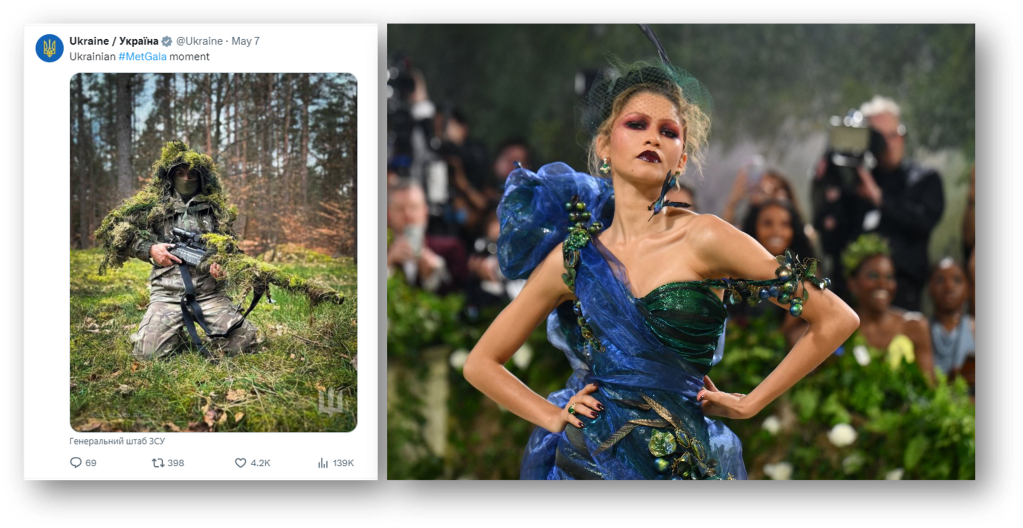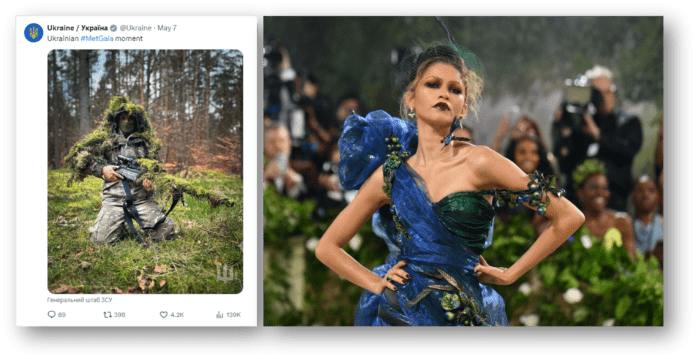Acknowledgement: This blog post is part of a paper that I presented at a recent workshop on humor and global politics at the University of Sheffield. I am thankful to all participants and to the organizer, Dr. Dmitry Chernobrov.
Since the beginning of the Russia-Ukraine War, Ukraine has used social media to rally online and offline support for its war effort. Using a host of digital platforms including X, Facebook, Instagram and Telegram, Ukraine has sought to capture and retain the attention of global, digital publics. This is no easy task given the short attention span of digital publics, their habit of scrolling from one post to another and the constant barrage of scandals, celebrity mishaps and international crises that are communicated daily online. Ukraine’s efforts have included using social media to raise funds from average users, to create an IT army that can coordinate cyber attacks against Russian targets and appointing digital Ambassadors that help Ukraine reach diverse digital users, Ambassadors such as Star Wars actor Mark Hamill and singer Barbra Streisand.
What is unique about Ukraine’s digital approach is its heavy reliance on humor when communicating on social media. One would think that a violent War which has claimed the lives of thousands of individuals, and which has displaced hundreds of thousands of individuals, would be no laughing matter. However, Ukraine has demonstrated that a strategic approach to humor can benefit a country, especially one caught in a war of attrition that spans months or years. Indeed, the longer the war, the greater the chance of “War fatigue” among social media users who crave new viral trends and controversies.
On its main Twitter accounts, Ukraine has published dozens of humorous tweets, many of them referencing popular culture. The reason for this may be that humor requires knowledge. Understanding a joke necessitates both cultural and historical knowledge and jokes that would be considered funny in one culture might fail to resonate with other cultures. Consider, for instance, the very English joke below.
A Vicar in a small Parish wrote a letter to his Bishop stating “my wife has died. Please send the replacement”.
Humor scholarship suggests that this joke is funny given the incongruity or dissonance between the Vicar, a priest in the English Church, and his demand for a woman to replace his wife. There is also the initial confusion as one might assume that the Vicar is asking for a replacement wife when he is really asking for a Vicar to relieve him of his duties. This joke may not travel across cultures and borders given that it requires previous cultural knowledge such as the attributes of the Church of England as well as a high proficiency in English to “catch” the word play of a replacement wife.
The question that emerges is how can Ukraine create humorous content that could be understood by a global audience of social media users? The answer is popular culture. Global pop culture creates a globally literate public, one that can understand a multitude of jokes that reference TV shows, movies, computer games and celebrity culture. A joke comparing Ukraine’s President to Captain America or depicting Russian President Putin as the villain Thanos or asking for Harry Potter’s aid would be understood by social media users in Western and Eastern Europe, as well as in the Middle East, Africa and Southeast Asia.
Ukraine’s reliance on popular culture was already noticeable during the early stages of the War, as is the case with the tweet below published in March of 2020, one month after Russia’s invasion.

Since then, Ukraine’s use of humor has grown more sophisticated. For example, Ukraine now uses humor to address serious issues and to ensure military support from Western Europe and North America. Such is the case with the meme below of Harry Potter which clearly states that “we don’t expect patronum spells- we need patriot missiles’ ‘. The phrasing of the tweet is reminiscent of President Zelenskyy’s famous reply to a rescue offer by the US stating, “I don’t need a ride, I need ammunition”. The tweet uses the Harry Potter universe to explain the needs of Ukraine, to demonstrate the urgency of Ukraine’s plight and to relate to digital publics why the Patriot missiles are so important- because like patronum spells they may help Ukraine fight off Russian soldiers, or dementors in Potter’s language.

Moreover, Ukraine now uses humor in response to current events thus ensuring the timeliness of its jokes. For instance, when videos emerged of Russian Priests consecrating Tanks before battle Ukraine quickly published a similar video with the phrase “Oh. My. God. Literally” a nod to the famous line from the television show Friends. This joke is used to narrate events to digital publics or help them make sense of this prolonged War. In this case, Ukraine may have sought to depict Russia as losing the War and resorting to prayers to offset Russian losses on the battlefield.

Another tweet, shown below, was published in conjunction with the Met Gala, an annual star-studded event. What is most important is the visual resonance between the Ukrainian soldier shown below and some of the scenes from the actual Met Gala. This humorous tweet may have been invoked to once again summon the attention of social media users and retain that attention. In terms of narrating events, this humorous tweet may have sought to remind digital publics that Ukraine is very much part of Western culture and the “West”. Since the War broke out Ukraine has emphasized that it is part of the “West” to negate the misconception that Ukraine is part of Russia.


Third, Ukraine’s humor has grown much more violent. Ukrainian accounts now routinely publish videos from drones documenting the destruction of Russian tanks, armored vehicles and equipment. These tweets often promise to rain hell on Russian soldiers and are accompanied by rock and roll music. Although very violent in nature, Ukraine may be using such humor strategically to “prove” that its War effort is succeeding and that military support for Ukraine is helping it win the battle against Russia. This is an important message as Ukraine hopes to secure continuous military aid amid growing criticism in different countries.
It is important to note that Ukraine’s use of humor may have detrimental effects. The fusing of pop culture and War serves to legitimize War and make it “fun”. In the long term, humorous tweets of war may make war more palatable to social media users. Moreover, tweets that blend humor and nature, such as the “Met Gala” tweet above, suggest that war is a natural or logical response to tensions between states. In this way, war is transformed from a regrettable last resort to a first and natural resort, as Susan Jackson argues. Finally, humorous tweets of war mask the violence, pain and suffering caused by wars and depict war as something that can be laughed at. Ukraine’s use of humor may thus have a negative long-term impact on digital publics and their acceptance of wars as a foreign policy instrument.
For more on the role of humor in digital diplomacy click here








